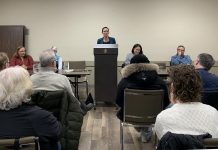
For Our Grandchildren (4RG), a non-profit environmental organization that encourages action against climate change on the local level, has released the responses to questions on four environmental topics that the organization has received from three of the six candidates for Peterborough-Kawartha in the provincial election on Thursday (February 27).
4RG provided the candidates with the opportunity to respond to questions about adding more parks and protected areas, improving land use planning, addressing the climate crisis, and consulting with Indigenous communities and the general public. According to 4GR, the questions and accompanying background information were developed by several people active in Peterborough-area environmental organizations.
Jen Deck of the Ontario New Democratic Party, Lucas Graham of the Green Party of Ontario, and Adam Hopkins of the Liberal Party of Ontario all provided responses to the questions.
Although 4RG initiated contacts at least twice with all candidates after providing the questions, they did not receive responses from incumbent MPP Dave Smith of the PC Party of Ontario, Andrew Roundny of the New Blue Party, or Brian Martindale of the Ontario Party.
Below are the responses received from the NDP, Green, and Liberal candidates on each of the four topics (in some cases, the original responses have been formatted for easier reading).
1. What would you and your party do to add more parks and protected areas?
Would you provide incentives/funds and streamline additions to more parks, protected areas, and Indigenous areas, on both public and private lands? Would you commit to the wider goal of protecting 30% of Ontario’s lands and waters by 2030?
Jen Deck, Ontario New Democratic Party
The Ontario NDP supports the goal of protecting 30% of our lands and waters by 2030. This includes expanding provincial parks and conservation areas, and supporting Indigenous-led conservation efforts in Northern Ontario
Lucas Graham, Green Party of Ontario
Yes, I fully support the goal of protecting 30% of Ontario’s lands and waters by 2030, and the Green Party is committed to making this a reality. We believe in expanding and properly funding parks, protected areas, and conservation lands to preserve Ontario’s natural heritage, safeguard biodiversity, and strengthen climate resilience.
To achieve this, we would:
- Increase funding for land trusts, conservation authorities, and Indigenous-led protection efforts to accelerate the creation of new protected areas, ensuring communities have the resources to conserve ecologically significant lands.
- Streamline the process for designating new protected areas by eliminating bureaucratic barriers and working collaboratively with municipalities, conservation groups, and Indigenous nations.
- Strengthen protections for existing natural areas, including wetlands, forests, and waterways, to prevent further environmental destruction from unchecked development.
- Support Indigenous Protected and Conserved Areas (IPCAs), ensuring that Indigenous leadership and traditional ecological knowledge guide conservation efforts, in line with reconciliation and UNDRIP commitments.
- Provide financial incentives for private landowners to conserve lands through tax benefits, conservation easements, and stewardship funding.
The Ford government has actively weakened environmental protections, cut funding to conservation authorities, and prioritized short-term corporate interests over long-term sustainability. We will reverse these harmful policies and put nature first.
Ontario is rich in natural beauty, and protecting it should be a priority — not an afterthought. By committing to 30×30, investing in conservation, and partnering with local communities and Indigenous nations, we can ensure that future generations inherit a healthier, more sustainable province.
Adam Hopkins, Liberal Party of Ontario
The Ontario Liberals emphasize the importance of preserving Ontario’s natural landscapes and agricultural resources. This includes a strong commitment to protecting prime farmland, including the Greenbelt, as a way to maintain food security, safeguard the environment, and support the economic well-being of farmers and rural communities.
Recognizing the value of these lands for both current and future generations, we advocate for policies that promote sustainable land use while balancing the needs of development, conservation, and economic growth.
Additionally, we acknowledge the role of a thriving agri-food sector in contributing to Ontario’s economy and ensuring long-term environmental stewardship. We commit to continuing to explore ways to enhance sustainability, address emerging challenges, and collaborate with communities, experts, and stakeholders to uphold responsible land management practices.
2. What would you and your party do to strengthen provincial land use planning policies and community input?
How would you better: protect the Greenbelt, wetlands, and other natural and farmland areas; avoid flooding and forest fire impacts and sprawl; and ensure deeply affordable housing, sustainable and cost-efficient infrastructure, and good building design?
Jen Deck, Ontario New Democratic Party
An Ontario NDP government will update planning rules and policies to make it cheaper and easier to build more types of homes for more types of people, more quickly, in more neighbourhoods. This includes legalizing more affordable “missing middle” housing options like semis, townhomes and four-storey multiplexes in all neighbourhoods, and legalizing midrises along transit corridors transit as-of-right.
We’ll also keep housing infrastructure costs down and protect farmland by focusing growth efficiently and cost-effectively within the pre-2022 municipal urban boundaries. We will also restore the powers of conservation authorities, so they can once again protect people and property from floods and other natural hazards.
The NDP also understands that not everyone can afford what the private market can profitably deliver, which is why the NDP has proposed a new public agency, Homes Ontario, that will provide grants, low-cost financing, public land and other support to enable the construction or acquisition of at least 300,000 new permanently affordable public, non-profit and co-op homes within ten years.
Lucas Graham, Green Party of Ontario
Ontario’s land use planning should prioritize people and the environment — not developers’ profits. The Ford government’s reckless planning decisions have weakened public input, encouraged urban sprawl, and put farmland, wetlands, and the Greenbelt at risk. The Green Party would reverse these harmful policies and implement responsible, sustainable land use planning that balances conservation, housing, and climate resilience.
Here’s how we would do it:
- Protect the Greenbelt, wetlands, and farmland permanently by strengthening land use laws to prevent future attacks on these vital ecosystems. We will also expand protected areas to preserve more agricultural and natural lands.
- End costly urban sprawl by ensuring new development happens within existing urban boundaries, focusing on gentle density, missing middle housing, and transit-oriented communities that reduce car dependency.
- Ensure deeply affordable housing in every community by prioritizing non-profit, co-op, and mixed-income housing developments, and requiring a portion of all new developments to be truly affordable.
- Support flood and wildfire resilience by protecting natural buffers like wetlands, forests, and green spaces, implementing stricter zoning laws to prevent building in high-risk areas, and strengthening climate adaptation measures.
- Invest in sustainable, cost-efficient infrastructure by prioritizing mass transit, energy-efficient buildings, and walkable communities that reduce congestion and emissions while lowering costs for municipalities.
- Restore public input in planning decisions by reinstating local and community decision-making powers, strengthening environmental assessment processes, and eliminating the overuse of Minister’s Zoning Orders (MZOs) that bypass community consultation.
Good land use planning isn’t just about where we build — it’s about how we build sustainable, affordable, and livable communities that protect nature and improve people’s quality of life. The Green Party is committed to smart, forward-thinking planning that serves people and the planet, not just developers.
Adam Hopkins, Liberal Party of Ontario
In addition to our commitment to protecting prime farmland, including the Greenbelt, and supporting a sustainable agri-food sector, our platform highlights the importance of smart, strategic investments in infrastructure to support growing communities.
Recognizing the need to reduce gridlock and improve mobility, we emphasize the value of expanding and enhancing public transit options, as well as maintaining and upgrading road networks to ensure efficiency and safety.
Furthermore, we acknowledge that strong, well-planned communities require essential infrastructure, including hospitals, schools, and other public services that contribute to a high quality of life. By prioritizing responsible investment, we aim to foster sustainable growth that balances economic development with environmental stewardship.
Our approach reflects an ongoing commitment to working collaboratively with municipalities, stakeholders, and experts to ensure that Ontario’s infrastructure meets the needs of today while preparing for the future.
3. What are your views on the climate crisis and your and your party’s plans to reduce our growing carbon footprint?
How would you accelerate implementation of nature-based solutions (e.g. protecting trees and wetlands), cycling and transit infrastructure, low carbon electrification, and other technologies? What and when would you add such items in to the Building Code and to energy, funding, and planning policies?
Jen Deck, Ontario New Democratic Party
The NDP has proposed an ambitious plan to help people reduce their energy bills as well as their carbon footprints, while also creating good jobs.
An Ontario NDP government will provide rebates depending on household income, to help households install electric heat pumps, with access to easy interest-free financing. An additional rebate will be available for households that heat with fuels like propane or heating oil. This program would not only help reduce greenhouse gases and help people save money, it would create good jobs for installers, renovators and heat pump manufacturers.
An NDP government will also help Ontario drivers make the switch to an electric vehicle, with income-tested rebates towards the purchase of an eligible new or used battery-electric vehicle or plug-in hybrid. We’ll also ensure that new homes are future-proofed for the energy transition with low-cost EV-ready infrastructure, so homeowners with garages can install electric vehicle chargers cheaply when they choose to make the switch, instead of paying thousands of dollars in retrofitting costs.
We will also enhance Ontario’s SaveONEnergy Energy Affordability program to provide retrofit support to renters and low-income households, ensuring fair access to Ontario’s energy savings programs
Lucas Graham, Green Party of Ontario
The climate crisis is the greatest challenge of our time, and we need bold, urgent action to tackle it. Ontario’s emissions are rising under the Ford government, and its continued expansion of highways, urban sprawl, and fossil fuel use is making things worse. The Green Party has a real plan to cut emissions, transition to a clean economy, and protect our communities from climate disasters.
How we’ll reduce Ontario’s carbon footprint:
- Phase out fossil fuels and electrify Ontario’s energy grid by banning new gas plants, expanding wind, solar, and hydro power, and investing in energy storage to create a reliable, low-cost, 100% clean electricity system.
- Modernize Ontario’s Building Code to require net-zero-ready homes and commercial buildings by 2030. We will also remove outdated rules that block solar panels, electric heat pumps, and energy-efficient retrofits in new and existing buildings.
- Implement a ‘Green Infrastructure First’ policy that prioritizes trees, wetlands, and natural flood prevention in all new developments to prevent extreme heat, wildfires, and flooding.
- Expand public transit and active transportation by increasing funding for buses, cycling infrastructure, and commuter rail while ending costly highway expansion projects that drive up emissions.
- Retrofit 40% of Ontario’s homes and buildings by 2035 to be energy-efficient, cutting emissions and saving people money on heating and cooling bills.
- Invest in low-carbon industries and jobs by supporting Ontario-made clean technology, battery production, green manufacturing, and sustainable farming practices.
The Green Party will accelerate these changes immediately, starting in 2025, to ensure Ontario meets its emissions targets and builds a resilient, low-carbon economy. The time for half-measures is over — we need real leadership on climate action, and that’s what Greens will deliver.
Adam Hopkins, Liberal Party of Ontario
The Ontario Liberals recognize the importance of environmental stewardship and the need for a comprehensive, forward-thinking approach to protecting the province’s natural resources.
As part of this commitment, we will develop a Made in Ontario environmental action plan that will be shaped through collaboration with the federal government, other provinces, and key stakeholders. This plan will focus on safeguarding Ontario’s land, water, air, biodiversity, and communities while ensuring that economic and environmental priorities are balanced in a responsible and sustainable manner.
By working in partnership with experts, Indigenous communities, environmental organizations, and industry leaders, we aim to explore innovative solutions and best practices that support long-term ecological health.
Our approach reflects an ongoing effort to address environmental challenges, promote resilience, and adapt to evolving needs while maintaining a strong commitment to transparency, consultation, and evidence-based decision-making.
What is your party’s approach to consultation with Indigenous communities and enhanced citizen input and appeal processes?
Would you enhance these in land use planning, environmental assessments, the Environmental Bill of Rights, conflict of interest laws, and by reforming Ontario’s open access mining system?
Jen Deck, Ontario New Democratic Party
The Ontario NDP supports the United Nations Declaration on the Rights of Indigenous Peoples (UNDRIP), which includes the right of Indigenous people to free, prior and informed consent with respect to land use activities impacting their traditional territories.
In 2019, NDP MPP Sol Mamakwa tabled Bill 76 to formally enshrine UNDRIP in provincial law. An NDP government will also end the abuse and overuse of Minister’s Zoning Orders that have created a corrupt, two-tier planning system that unfairly allows certain favoured developers to bypass public consultation and the planning rules that apply to everyone else.
The Ontario NDP also supported First Nation calls for a moratorium on the use of electronic mining claims, begun under the Liberals, that has grown out-of-control under Doug Ford.
Lucas Graham, Green Party of Ontario
The Green Party believes that meaningful consultation with Indigenous communities and public engagement in decision-making are essential for a just and sustainable Ontario. The Ford government has weakened Indigenous consultation, environmental assessments, and public input processes — favouring corporate interests over the rights of communities and the environment. We will reverse these changes and ensure true transparency and accountability.
Here’s what we’ll do:
- Respect Indigenous sovereignty and rights by ensuring full, prior, and informed consent in all land use planning, resource extraction, and environmental decisions. We will align Ontario’s laws with the United Nations Declaration on the Rights of Indigenous Peoples (UNDRIP).
- End Ontario’s outdated open-access mining system, which allows companies to stake claims on Indigenous lands without consultation. Instead, we will create a respectful, transparent consultation process that prioritizes Indigenous leadership and environmental protections.
- Strengthen public input in land use planning and environmental decisions by reinstating strong environmental assessments, meaningful community consultation, and fair appeal processes. We will end the overuse of Minister’s Zoning Orders (MZOs) that bypass public input and favour developers.
- Restore and expand the Environmental Bill of Rights (EBR) to give communities a real voice in environmental decisions and ensure that environmental protections are legally enforceable.
- Strengthen conflict of interest laws to prevent backroom deals between the government and private developers, ensuring transparency and accountability in decision-making.
Democracy is more than just voting every four years. The Green Party believes in ongoing public engagement, respect for Indigenous leadership, and policies that put people — not corporations — at the centre of decision-making. We are committed to a fair, transparent, and just Ontario for all.
Adam Hopkins, Liberal Party of Ontario
I strongly believe that Indigenous communities must be consulted and meaningfully involved in matters affecting their lands, resources, and rights. Meaningful engagement is essential to fostering respectful relationships, recognizing Indigenous leadership in environmental stewardship, and ensuring that decisions reflect the interests and knowledge of Indigenous communities.
Collaboration and dialogue play a critical role in addressing shared priorities, supporting economic and environmental sustainability, and working toward solutions that respect Indigenous rights and self-determination. By listening to Indigenous voices and incorporating their perspectives, we can promote more inclusive and informed decision-making processes that acknowledge historical and contemporary realities.
I remain committed to engaging in discussions that strengthen partnerships and advance reconciliation in a way that respects Indigenous governance and traditions.


























